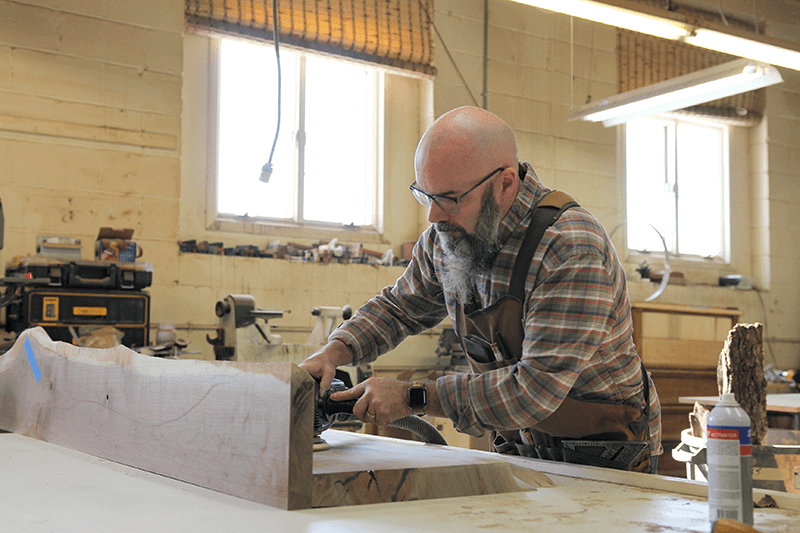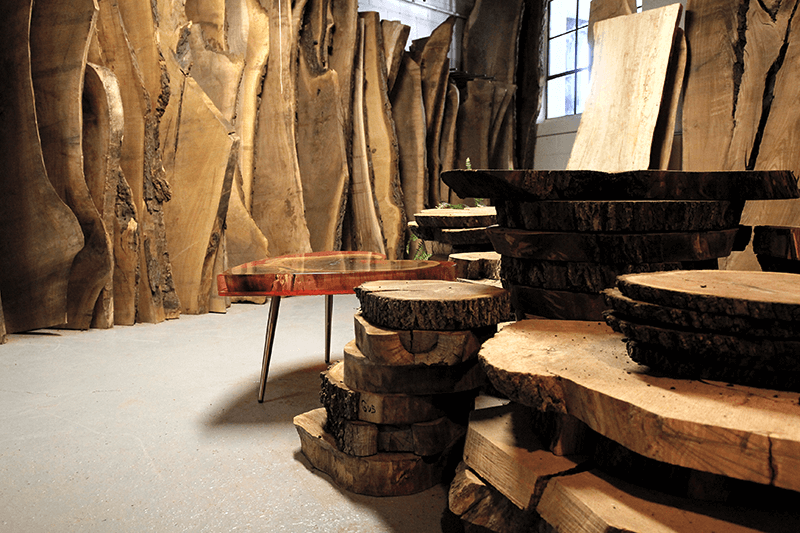Trees form an important part of our neighborhoods. In some cases, the trees in our yards are older than our houses. The oak tree in the yard of my childhood home was over a hundred years old when a storm nearly brought half the canopy down on my sister’s bedroom. It was a shame to see the 120-year-old tree go, so we kept sections of stumps around the fire pit we built where it used to stand, but time, weather, and carpenter ants saw to it that they didn’t last forever.
Fillory Design Company (fillorydesignco.com), a relatively new face to the Northeast art scene, seeks to give these kinds of stories a happier ending.
Todd Kendall, owner of Fillory Design, has been a carpenter for over 30 years, but this new venture is just a little over a year old. He bought his showroom/workshop on Roosevelt St. NE last October and has been working on giving the old industrial building a second wind, much like he does with the rows and rows of hewn slices of downed trees that now line its interior.
“These trees need to come down because they’re going to cause harm or damage. We take them down and give them a new life,” he explained.
Kendall gets all of his stock from his business partner, Eric Renstrom, owner of Renstrom Tree Service based in Lake Elmo. Renstrom’s company takes down trees like any other tree service company, but they offer to buy back any usable wood from their clients, usually in the form of a discount. Renstrom sells some of the timber his company collects as raw slabs with bark still around the edges, but he also makes pen blanks out of the smaller pieces as well. Kendall uses whatever material Renstrom doesn’t sell to stock his new workshop, Fillory Design.
The partnership between the two happened serendipitously. Kendall saw the raw slabs of a recently downed walnut tree sitting in a yard while out for a walk. The wood was perfect for a project he was working on, so he asked the homeowners, Renstrom’s parents, about buying some. They told him about the family business and got him in touch with Renstrom, and they hit it off. It wasn’t long until they began discussing the potential of a partnership.
“I figured, I’m only 50, you know, so why not?” said Kendall.
Often, the trees Renstrom takes down are very old and have some kind of story behind them: Sometimes they held a beloved treehouse or were planted by someone special long ago. In those cases, he and Kendall offer the property owners a deal on turning the old family climbing tree into a table or a chair that’ll stay in the family.
“It ties into giving extended new life to these pieces,” he said. “These are pieces that will have generations of ownership. You can’t just go out and buy them at Ikea.”
At Kendall’s new showroom, his clients are a 50/50 split between people looking for unique, custom-made furniture, and other artisans looking for just as unique, custom-sourced materials. The space is evenly divided between Kendall’s workshop a warehouse space to house all of the cross sections of trees that come in from Renstrom’s, and a front room full of finished pieces.
Most of Kendall’s work is in a raw-edge, rustic style that makes use of all the cracks, warps and imperfections in the wood he uses but he also admitted he would like to do more work with a midcentury modern style in the future.
Because of the nature of the raw-edge style, Kendall either has to get his hands on just the right piece for a project or get creative to work with what he has on hand. Every piece of wood he has is unique. This presents its own benefits and challenges for the type of custom work he does, but it guarantees the personality of the original tree comes through in the finished piece, especially for jobs that have a story behind them.
“This is so much more a labor of love because of the source. I can’t even take credit for making a lot of this stuff, it has its own natural sort of beauty itself,” he said, explaining that the nature of his and Renstrom’s partnership means that all of his creations come from locally sourced wood that isn’t being forested. This keeps all the material from going to waste after the tree comes down.
A lot of the wood Kendall has in stock would be unusable for commercial purposes. The boards have knots or cracks in places that make it impossible to fashion a functional two-by-four, and some are blighted by diseases or insects. All of his stock is kiln-dried before he works with it, which kills off any critters still in the wood, but the holes or stains they leave behind functionally ruins the wood for ordinary work. For his purposes though, it’s perfect. The flaws in each piece become the features.
“It adds to the story. That’s just nature!” he said, showing off a pinkish hue left in a sheet of boxelder maple wood by a fungus. The fungus itself has been cooked out by the kiln, leaving the wood an unnatural shade of pink he plans to use to pretty up a countertop.
Fillory Design is still building its foothold in Northeast, but Kendall said it’s already outgrowing the space it has. He hopes to soon be able to expand into a more foot traffic-friendly space in the future.
Photos: Todd Kendall filled in cracks in the wood and sanded the surface down to make a smooth, unified surface for a vanity countertop. The client was in love with the contours of the raw edge of the wood, so Kendall added another sheet of wood to the back to make it the right size, and filled in all the cracks to make it suit its new purpose. Inside Kendall’s workshop and showroom on Roosevelt St. NE. He gets the reclaimed wood from Renstrom Tree Service. (Photos by Alex Schlee)

